
November 29, 2022
Our editors have independently chosen the products listed on this page. If you purchase something mentioned in this article, we may
Falling in love is one of the best feelings we can experience as humans. There’s something magical about that instant click when you meet your person. The sun shines a little brighter and life feels better when you’re less lonely. In fact, Harvard University once conducted an 80-year study about joy and found that a close, happy relationship was the greatest predictor of happiness and overall well-being.
The good news? With all of this new technology at our fingertips, it’s never been easier to find a romantic connection. And if you’re looking for a serious relationship, eharmony and Match happen to reign supreme in the world of dating apps.
These dating sites were the original dating hubs for singles to find long-lasting love, near and far. For both, the algorithm relied on a high level of compatibility filtering via in-depth profile information and quizzes to parse out your future partner. Because of the level of commitment it takes to fill out your profile, eharmony and Match have held tight to their reputation as a detail-rich dating destination for serious-minded daters. But which one is the better app to use for what you’re looking for in 2022?
To take a closer look between eharmony and Match, we’ve reached out to dating experts and the sites’ spokespeople, and we’ve exhaustively researched all the pros and cons to help you figure out which is the best app for your needs. Read on to learn more about each of these dating apps’ unique features, success rate, user base, and more.
How to choose the right dating app for you.
Although it’s never been easier to be single and find matches, the trap of technology and having too many choices can also pose its own unique set of problems: Why is it so hard to get a conversation going? Why are first dates so freakin’ awkward? And perhaps most pressingly, does the other person want to hook up or date seriously? It’s already tough putting yourself out there, and uncertain intentions and ambiguous expectations make it harder to swipe and keep the momentum going.
To optimize success, it’s important to recognize that, for every dating app out there, there’s a different approach and demographic to lean into. Some apps, such as Tinder and Feeld, lean into casual sex—so it’s easier to form casual connections there. Other apps, such as Hinge, eharmony, and Match, are known for interesting profile prompts and a curated feed of high-compatibility matches. This latter category generally translates to more serious daters.
“We tend to see more cisgender heterosexual singles use Match and eharmony,” licensed marriage therapist Omar Ruiz, LMFT, tells mbg. “For people who would like to pursue a long-term relationship, people use both apps.”
A side-by-side breakdown of eharmony vs. Match.
Psychotherapist and certified sex and couples’ therapist, Lee Phillips, LCSW, CST, notes some pros and cons for the sites below.
Fast facts on eharmony:
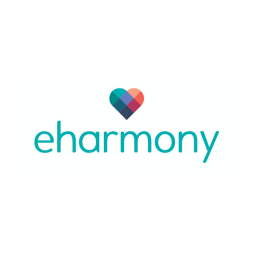
Pros:
- Known for its longevity
- Shows compatibility score with each match
- Scientific, AI approach to matchmaking
Cons:
- Lengthy sign-up process
- Expensive
- Not as tailored to casual daters
Ever since the year 2000, eharmony has been making marriages and love happen with their proprietary compatibility platform and informative quizzes. They pride themselves in creating long-term relationships and helping millions of people find authentic connections. eharmony proudly owns its reputation of being less of a hook-up site and more for people who are looking for something real.
(Here’s our full eharmony review if you want a deeper dive.)
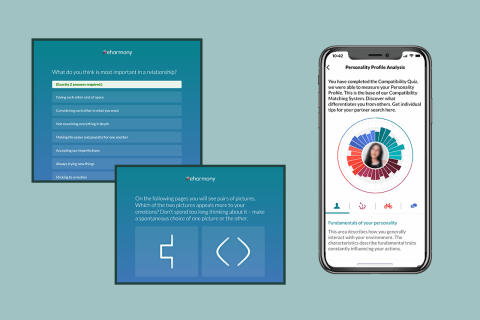
How eharmony works:
Clear out an afternoon to give yourself time to set up your eharmony profile. While it’s lengthy, the site tries to make the involved process fun and informative as you work through a thought-provoking compatibility quiz to learn more about your boundaries, attitudes toward relationships, how you react to everyday scenarios, communication styles, and more.
When you set up your bio on your page, take it as an opportunity to showcase yourself and what you’re all about since you’ll have plenty of room. The extra detail will pay off with more information for its AI to improve the algorithm for you later on. Once completed, eharmony leverages those same data points to match you with other users based on your answers and compatibility score.
Key features:
- Personality profile: After completing the Compatibility Quiz, eharmony offers additional value with its Personality Profile as part of your membership package. This feature neatly packages the insights from your report with personalized relationship tips about how to find a partner who’s best for you
- Interactive icebreakers: Move away from the “what are you doing?” messages and use one of their “smile” features or icebreaker prompts to jump-start your conversation. When using the icebreaker feature, it’ll give you and your match five pairs of images you can pick. After making your selections, you can both see your responses and have something in common, so it feels less awkward to begin the chat.
- Video date feature: Dating can be exhausting. If you just want to ensure some sparks will fly for your in-person meeting, you can call them on video and suss out the chemistry in the safety of your own home (and comfy pajamas).
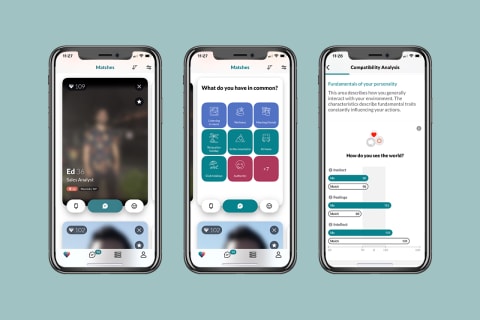
Cost:
The premium version of the site comes in varying bundle lengths: a six-month Premium Light membership, a 12-month Premium Plus membership, and a 24-month Premium Extra Month membership. Depending on location, subscription type (the more months you purchase, the cheaper the monthly plan), and the features you want, you can pay anywhere between $12 and $60 per month.
Pro tip: Search around for deals, as eharmony offers discounts regularly. Although they price out their plans with monthly rates, you’ll need to either pay for the entire subscription in one lump sum or in four monthly installments. Be sure to cancel auto-renew for whatever plan you choose so it doesn’t accidentally enroll you for another membership unless you choose to opt into it.
What eharmony reviews say:
- “I met my boyfriend on eHarmony a few years ago. We’re planning to get married in the next year. When we met, eHarmony was the only dating app he was using, so if I didn’t use it, we wouldn’t have met. Also, one of my best friends (about the same age as me) met her husband on eHarmony several years ago. I do agree that there weren’t as many matches/dates from eHarmony compared to other dating sites I was using at the time. But you only need one good match for it to be all worth it, right?” —brooke437, Reddit
- “Typically, a lot of dating apps tend to focus on finding someone who will love you and make you feel good and without much discernment on your personality and test that pairs matches. As a result, you end up with very specific matches and in order to make a commitment with pursuing a girl you like, you need to pay for a subscription. eharmony gives a personalized set of matches according to your area, interests, and personality.” —shield wold 94, App Store
- “I was on for over six months or so and went on one date if that gives you any indication of the type of ‘matches’ I received. The guys I liked were not interested and the guys that liked me were so not my type. Waste of money for me unfortunately.” —moe_comedy, App Store
- “At first, I wasn’t so sure about this app and the price was quite high, but my dad insisted this is the best app for finding a future spouse. Three months in and he was right! If you are looking for something serious and you are willing to invest for a more marriage-minded dating app, then this is the site for you!” —biblebiblebiblebible, App Store
Fast facts on Match:
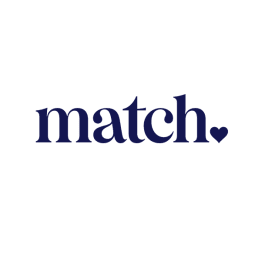
Pros:
- Mix of casual & serious daters
- IRL mixer events
- Free 1-on-1 calls with dating coaches
- Daily Match recommendations
Cons:
- History of fake profiles & scammers
- Lots of inactive users
Touted as the original dating site, Match has been around since 1995. After two decades, the parent company’s portfolio now includes other dating service heavy hitters such as OkCupid, Hinge, Tinder, and Plenty of Fish. As for the Match.com dating site itself, because of its large database, you can easily search for people who are looking for the same thing you are – from dating to serious relationships and everything in between.
(Here’s our full Match review if you want a deeper dive.)
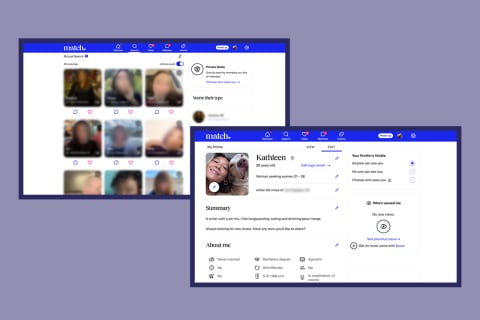
How it works:
Match doesn’t require a heavy lift to set up your profile—although you shouldn’t skimp on the details to get right to the matches. As soon as you log on, you have the opportunity to fill out basic prompts to help filter out the wrong matches and filter in the right people. You can set your geographic preferences, body type, relationship aspirations, exercise habits, and alcohol/smoking habits. You also type out your interests and bio to summarize what you’re all about, though the site makes it easy with built-in topics so you’re not staring at a blinking cursor on a blank page. Then you can use their robust search engine to start matching people and “liking” potential dates.
Key features:
- On-call dating expert: If you’re looking for hands-on help for some of your dating woes, you can use AskMatch, a phone-based service for Match members to chat with a relationship coach. Ask them anything your heart desires: help writing out the perfect starting message, how to improve your profile, deal with ghosting, or select the perfect first date outfit to wow your date.
- Matching features: “What I found most unique is the reverse matching and mutual matching features: The reverse matching feature shows the people looking for your likes, interests, and such, while mutual matching shows the people who fit your criteria in a partner,” writer Kathleen Wong recently wrote at mbg.
- Missed connections: Ever wonder if you’ve crossed paths with the love of your life in your neighborhood? You’re in luck—Match has a geolocation feature to let you know when a potential match that fits your criteria was recently within your area. For safety reasons, it doesn’t show when you’re nearby until after a few hours have elapsed, and it won’t show exact location but instead will mark out an approximate area. You can take matters into your own hands and choose whether you would like to connect with them or not.
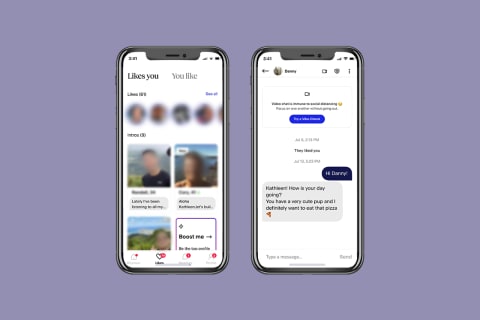
Cost:
Match has three standard plans and three premium plans (all of which come in three- to 12-month bundles) that you can purchase. Similar to eharmony, if you choose a higher monthly bundle length, the prices are lower.
Their cheapest plan, their Standard Plan, for one year is $12 per month, or their Premium Plan for one year is priced at $14. The plans can be paid in one go or through four installments. If you want to purchase the premium add-ons like read receipts, Match Phone, or allowing any user to respond to your messages, it can run between $2 and $10.
What Match reviews say:
- “If you’re looking for a genuine relationship, I highly recommend this app. Since you have to pay, I feel the quality of people on here is far greater than most other dating apps. I met my husband the first day of using this app. After taking a few weeks, we had our first date and 1 ½ years later, we tied the knot! The app was simple to use and I don’t remember any issues.” —meastoughts, App Store
- “Unfortunately, this really depends on your location. Apps can be gems in one city and a stinker in another. With online dating, you kind of just need to try everything to see what works for you where you are. I tried Match a little over a year ago, and I found it to be awful in my area. Others have said positive things about it, however, I found it to be total trash where I am. I browsed hard for a few days and then asked for my money back within their three day refund window.” —sage_planter, Reddit
- “I’ve been on Match for about a month now. Got one response from a message in that time, and haven’t heard back. That’s more than I got from Tinder (three scammers) or Bumble (absolutely nothing). Plenty of Fish has been pointless for me as well. And it’s all the same people across the apps.” —imaginarypersona, Reddit
- “Spoke with a dating coach, Katya, today. She was so professional, pleasant, and helpful. She reviewed my profile, discussed better ways to structure my messages, helped me to organize and present my photos, and we discussed how to reach a broader audience. I highly recommend taking advantage of this service.” —fuzzbee, App Store
eharmony vs. Match: Key differences and comparisons.
- Highest success rate: Match is used by over 39 million users, so numerically speaking, math is on your side if you’re looking for a big pool of potential matches. On the other hand, eharmony reports a new match is made every 14 minutes, and the site is supposedly responsible for 4% of marriages in the U.S. Because eharmony has more claims to support the success of their long-term relationships, eharmony wins this category.
- User base: Although eharmony and Match trend toward an older demographic of 30s and beyond, both of the sites’ spokespeople pointed out a wide age range of users on their site. For eharmony, over half of the users are Gen Z and millennials, and the site is made up of 51% men and 49% women. For Match, 19% of Match users are between the ages of 18 and 29, 44% are between 30 and 49, and 37% are 50 and up. On that note, both sites are great for people of all ages but may work better for older daters.
- Cost: Compared to the free apps out there, both sites use a subscription-based model with monthly bundles and optional paid features. eharmony ranges between $12 and $60 per month, but Match clocks in at a slightly cheaper cost running between $12 and $23 a month with a subscription, or $46 for a single month if you would rather not purchase months in bulk. Match also has a guarantee that if you haven’t found a match within the first six months of being on the site, the next six months will be free. From a pure dollar standpoint, Match is the way to go if you want to pay less money.
- How you match with people: Match relies on their good old-fashioned, extremely thorough search function for users to find each other. The site also recently launched Expert Picks—an algorithmic feature to help filter romantic suggestions for their users based on dating coaches’ expertise. eharmony deploys personality tests and quizzes to break down how you and your potential connection are compatible. Through this information, it helps determine a score to optimize their compatibility matching system. Depending on what you’re looking for with your matches, Match offers expert advice, while eharmony uses big data.
- How you message people: eharmony requires some upfront work before you can even see matches—first, you’ll have to take an 80-question compatibility quiz, and then you’ll have to take the time to fill out your profile to a certain percentage level. After that process, you can begin to check out profiles and reach out. Match doesn’t ask for the same level of commitment: After answering a few quick questions, you can begin browsing through other profiles using detailed filters with your criteria in mind. But if you’re on the basic plan, you’ll be hit with plenty of paywalls until you decide to pay to use the app.
- Unique features: Match is big on privacy and safety: The site offers a vaccination badge to display vaccine status, a vibe check for video calls before the IRL meeting, a unique Match-generated number for users to call and text each other, and a background check service to help users screen dates. On the other hand, eharmony allows you to look at people’s profiles anonymously, send smiles and icebreakers, and use your Personality Profile and compatibility quiz to evaluate your matches.
- Design and interface: eharmony and Match have both made huge strides with their interfaces, making it easy for younger and older ages to play with. Match has a straightforward, modernized design and shows you one match at a time. eharmony also boasts a user-friendly design with detailed profiles, plenty of pictures (up to 26 photos), and many filters to sort matches through.
- Sign-up process: As mentioned, eharmony has a comprehensive sign-up process, which may be preferred by people who err on the side of having a lot of quality information for a higher level of discernment on both sides. Better to know each other’s nonnegotiables and deal-breakers before the first date. Match’s sign-up process is way simpler with a few preliminary questions and not as big of an emphasis on profile completion before you match with others.
Which app is more worth the cost: eharmony or Match?
“When it comes to cost considerations, eharmony has a more extensive process of matching than Match, which in theory will connect users with more aligned matches,” says Alyssa Dineen, a dating expert, author of The Art of Online Dating, and founder of Style My Profile. “However, in most areas, Match is more widely used and therefore would have a better selection of potential dates, making it theoretically more worth the cost.”
“As with all dating apps, the usage varies geographically, including usage by age,” she tells mbg. “For example, within major cities, neither eharmony nor Match is widely used for people under 60. Even outside of metropolitan areas, in my experience, Match is more popular than eharmony.”
As for which app is worth your buck, Dineen recommends choosing the dating service that works best for you and your unique situation. Just like any other person you’re dating, treat the apps the same way. Be choosy and selectively pick the apps that can garner success for you. Don’t look at the overall general reviews, but instead check out reviews from people who are in a similar demographic and geographic area.
Which dating site is better for people over 50: eharmony or Match?
Ruiz and Phillips both recommend eharmony as the preferred dating site for people over 50, especially if you’re looking for a serious relationship or to get hitched. They agree the dating app is better dedicated to finding long-term partners, whereas Match can also feature people interested in casual dating. For people over 50, it can also be harder to sort through bots and fake profiles, which are seemingly more prevalent on Match.
How do Match and eharmony compare to apps like Bumble?
If you’re new to dating and want to try out free options before moving toward a paid model, apps like Bumble may be a great option to start with.
If you’re interested in exploring polyamory or LGBTQ+ relationships, eharmony and Match may not hold a candle to apps like Bumble, OkCupid, and Hinge. “Even though eharmony now has gay and lesbian users, it’s not that inclusive of the whole of the LGBTQ community. This is partly because eharmony was originally started as a more ‘traditional’ pro-marriage dating site, founded by a Christian, and it’s still very much thought of in that way,” Dineen explains.
“By comparison, Match is more inclusive than eharmony of the LGBTQ community, but it’s still not as inclusive as apps like Tinder and OkCupid or LGBTQ-specific apps like Her, Grindr, and Feeld,” she says.
FAQ
Which dating site has the highest success rate?
eharmony has one of the highest success rates of the dating apps on the market in 2022, with more long-term relationships, active users, and a strong algorithm working on your behalf. The dating app reports a new match is made every 14 minutes, and they claim to be responsible for 4% of marriages in the U.S.
Which dating site is better: eharmony or Match?
eharmony is often considered the better dating site, but by a thin margin. Hard work pays off. The dating service requires you to put in time, effort, and information for the AI algorithm to learn about you and set you up with viable matches, whereas you can get set up and start browsing profiles much more quickly with Match.
What is the average age for eharmony vs. Match?
Both eharmony and Match tend to be more popular among older daters and have users that are generally in their late 20s or above. Though for eharmony, over half of the users are in fact Gen Z and millennial. On Match, 19% of users are aged 18-29, 44% are aged 30 to 49, and 37% are 50 and up.
Do people still use eharmony and Match in 2022?
People still use eharmony and Match, but because the apps respectively require more detail and a financial investment to interact with the app fully, they aren’t as popular as free apps such as Tinder, Bumble, and Hinge. However, it’s good to give these sites a try if you aren’t having as much luck on the other platforms or if you’re looking for something very specific (age, religion, distance, children) and want to take advantage of being upfront about your preferences off the bat.
The takeaway.
For those who know exactly what they want, Match has a powerful filtering system and an expert in your pocket that can take your connections to the next level. If you like learning more about yourself, know exactly who you are, and want to match with people that take the same approach in dating, you’ll like eharmony better.
eharmony won’t be for you if you want to swipe and go, while Match probably won’t be your speed if you don’t want to commit to putting in the time and effort to search for your matches.
Times have changed, but eharmony and Match have been able to keep up with contemporary dating and connecting people with like-minded singles to nurture authentic relationships. If you don’t mind spending a little bit of money on your dating life, these dating apps are attractive options to widen your net to find your match.

